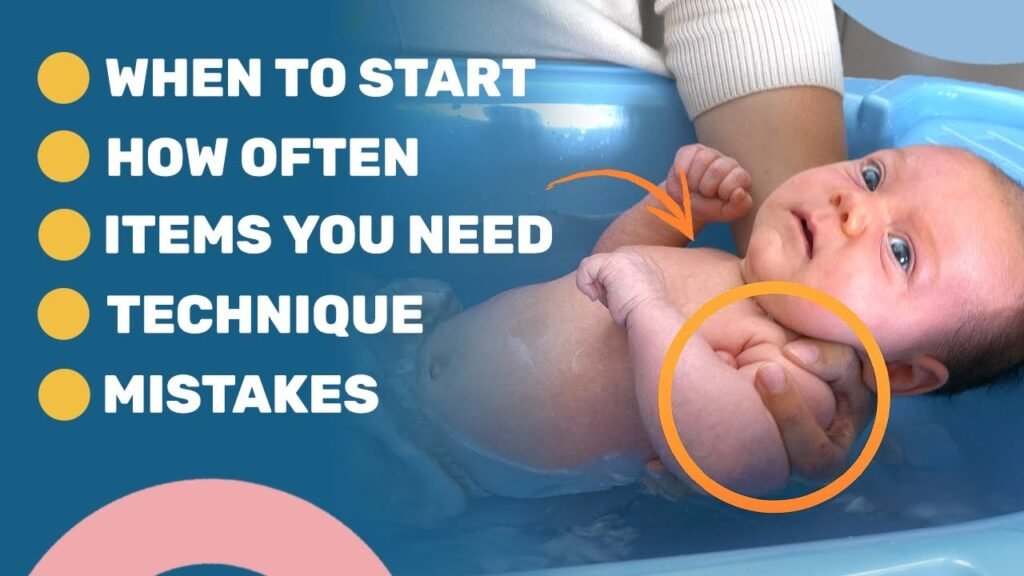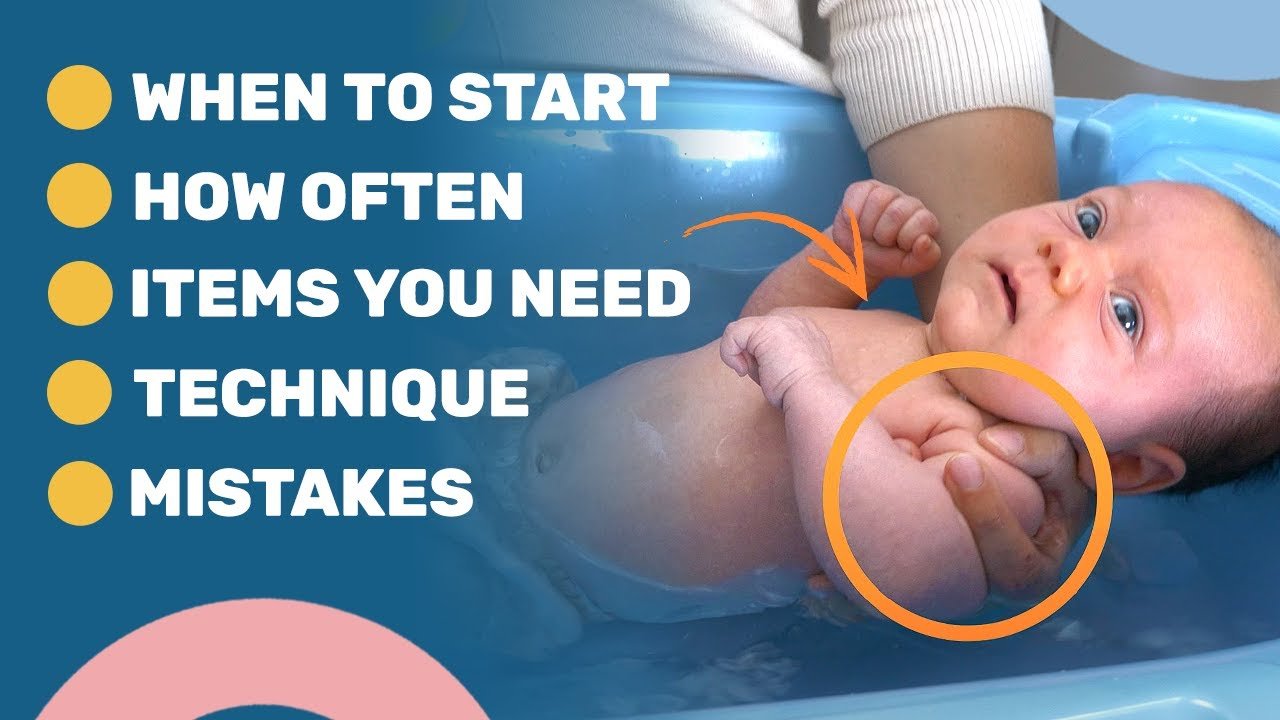Are you feeling unsure about how to properly bathe your newborn baby? Well, worry no more! In this comprehensive guide, you will learn everything you need to know about bathing your little one. From how often to bathe them and the best time of day to bathe, to the essential items you’ll need and safe techniques for holding your baby in the bath, this article covers it all. You’ll even find a step-by-step breakdown of the bathing process and helpful tips to make bath time enjoyable for both you and your baby. So, get ready to gain confidence and expertise in bathing your newborn with this informative guide.
Bathing a newborn may seem like a daunting task, but it’s important to remember that they don’t need to be bathed every day. In fact, bathing them too frequently can actually harm their delicate skin. So, it’s recommended to bathe your baby two to three times a week after their umbilical cord stump has fallen off. The best time to bathe your baby depends on their preference, with some finding it relaxing before bedtime while others prefer it during the day. Using a baby bath on a kitchen or laundry bench can make the process more convenient. This article also provides a list of necessary items for bath time, safety techniques for holding your baby, and a step-by-step guide to washing and drying your baby. By following this complete guide, you’ll become a bath time pro in no time!
Seeking Medical Advice: Health Concerns and Emergencies

Introduction to Seeking Medical Advice
When it comes to your health and the health of your loved ones, it is essential to know when to seek medical advice. Whether you have a minor health concern or are facing a medical emergency, understanding the signs and taking immediate action can make all the difference. In this comprehensive guide, we will explore common health concerns, ways to manage minor issues at home, signs of emergencies, first aid techniques, when to call emergency services, seeking professional medical advice, and utilizing online medical advice resources.
When to Seek Medical Advice
Knowing when to seek medical advice is crucial for maintaining your health and well-being. If you have any concerns about your health or are experiencing persistent symptoms, it is always best to reach out to a medical professional. Common situations that warrant medical advice include:
- Persistent and worsening symptoms
- Severe pain or discomfort
- Sudden changes in your body, such as lumps or swellings
- Difficulty breathing or shortness of breath
- Unexplained weight loss or gain
- Unusual changes in your skin or moles
- Recurring infections or illnesses
- Mental health concerns
Remember, it is better to be safe than sorry, and seeking medical advice can provide peace of mind and appropriate treatment if needed.
Common Health Concerns
Alongside knowing when to seek medical advice, it is helpful to be aware of common health concerns and how to manage them. Some common health concerns include:
- Colds and flu: These viral infections can cause symptoms such as coughing, sneezing, sore throat, and fever. Rest, hydration, over-the-counter medications, and proper hygiene practices can help manage these conditions.
- Allergies: Allergies can manifest in various ways, including seasonal allergies, food allergies, or allergic reactions to medications or substances. Avoiding triggers, taking antihistamines, and seeking medical advice for severe reactions is essential.
- Infections: Infections can occur in different parts of the body, such as the respiratory system, urinary tract, or skin. Proper hygiene, antibiotics (if prescribed), and seeking medical advice for severe or persistent infections are key.
- Digestive issues: Common digestive issues include indigestion, heartburn, constipation, and diarrhea. Lifestyle changes, over-the-counter medications, and dietary modifications can help manage these concerns.
It is important to note that this list is not exhaustive, and seeking professional medical advice is always recommended for accurate diagnosis and treatment.
Managing Minor Health Issues at Home
For minor health issues that do not require immediate medical attention, there are several ways to manage them at home. Some tips for managing minor health issues include:
- Resting and allowing your body time to heal
- Staying hydrated by drinking plenty of fluids
- Applying cold or hot packs to alleviate pain or swelling
- Taking over-the-counter medications, following the recommended dosage
- Practicing good hygiene, such as washing hands frequently and keeping wounds clean and covered
- Using home remedies, such as saltwater gargles for a sore throat or aloe vera for mild burns
- Monitoring your symptoms and seeking medical advice if they worsen or persist
It is important to remember that while home remedies and self-care can be helpful, they are not substitutes for professional medical advice. If you are uncertain about the severity of your condition or your symptoms worsen, it is best to consult a healthcare professional.
Signs of Emergencies
Recognizing the signs of emergencies is crucial for taking immediate action and potentially saving lives. Some signs of emergencies include:
- Difficulty breathing or shortness of breath
- Chest pain or pressure
- Severe injuries, such as deep cuts or fractures
- Loss of consciousness
- Signs of a stroke, such as sudden weakness or numbness on one side of the body, slurred speech, or confusion
- Seizures or convulsions
- Severe allergic reactions, including difficulty breathing, swelling of the face or throat, or hives
- Signs of a heart attack, such as chest pain or discomfort, shortness of breath, nausea, or lightheadedness
If you or someone around you is experiencing any of these symptoms, it is important to take immediate action and call emergency services.
Immediate Actions for Emergencies
When faced with an emergency situation, taking immediate actions can make a significant difference in the outcome. Some immediate actions to take during emergencies include:
- Stay calm and assess the situation.
- Call emergency services (911 in the United States) and provide clear information about the situation and location.
- Follow any instructions provided by the emergency operator.
- Administer first aid techniques if you have the knowledge and training.
- Keep the person calm and provide reassurance.
- Do not move a person with severe injuries unless necessary to prevent further harm.
- If the emergency involves a suspected heart attack or cardiac arrest, perform CPR if trained to do so.
Remember, it is essential to prioritize your safety and the safety of those around you during emergency situations. Following these immediate actions can provide valuable support before professional help arrives.
First Aid Techniques
Having basic knowledge of first aid techniques can be invaluable during emergencies or until professional medical assistance is available. Some essential first aid techniques include:
- CPR: Cardiovascular resuscitation (CPR) is performed in cases of cardiac arrest and involves chest compressions and rescue breaths.
- Heimlich maneuver: The Heimlich maneuver is used to dislodge an object from someone’s airway when they are choking.
- Basic wound care: Knowing how to clean and dress wounds properly can help prevent infections and promote healing.
- Bandaging: Learning how to apply different types of bandages can help control bleeding and stabilize injuries.
Seeking formal first aid training or certification is highly recommended as it provides in-depth knowledge and hands-on practice to confidently administer aid during emergencies.
When to Call Emergency Services
It is important to know when to call emergency services and seek immediate medical assistance. Some situations that require a call to emergency services include:
- Chest pain or pressure
- Difficulty breathing or shortness of breath
- Severe injuries, such as deep cuts or fractures
- Uncontrolled bleeding
- Loss of consciousness
- Signs of a stroke or heart attack
- Allergic reactions causing difficulty breathing or swelling
- Seizures or convulsions
- Severe burns or electric shocks
- Suspected poisoning or ingestion of harmful substances
Calling emergency services ensures that trained professionals can provide prompt care and transport the individual to a medical facility if necessary. It is always better to be safe than sorry when it comes to potential emergencies.
Seeking Professional Medical Advice
Seeking professional medical advice is crucial for accurate diagnosis, appropriate treatment, and ongoing healthcare management. If you have any health concerns, it is best to consult a healthcare professional who can provide expert advice and guidance. In many cases, your primary care physician or family doctor may be the first point of contact for non-emergency health concerns. They can evaluate your symptoms, order tests if necessary, and provide treatment options.
For more specialized concerns or emergencies, it may be necessary to visit an urgent care center or emergency department. These healthcare settings have the resources and expertise to handle a wide range of health issues, from minor injuries and illnesses to life-threatening emergencies.
Online Medical Advice Resources
In addition to seeking professional medical advice, online medical advice resources can be useful for gathering information and understanding common health concerns. However, it is important to approach online resources with caution and verify the credibility of the information provided. Some reputable online medical advice resources include:
- Websites of reputable healthcare organizations and hospitals
- Government health websites
- Virtual telemedicine services offering remote consultations with healthcare professionals
- Health forums and support groups moderated by healthcare professionals
Remember, while online resources can provide general information and guidance, they should not replace professional medical advice. Always consult a healthcare professional for personalized and accurate advice regarding your specific health concerns.
Conclusion
Knowing when to seek medical advice, recognizing common health concerns, understanding signs of emergencies, and having basic first aid knowledge are essential for maintaining your health and well-being. By taking immediate action during emergencies, seeking professional medical advice, and utilizing online resources responsibly, you can navigate health concerns with confidence and ensure the best possible care for yourself and your loved ones. Remember, your health is important, and seeking medical advice is always a wise decision.

